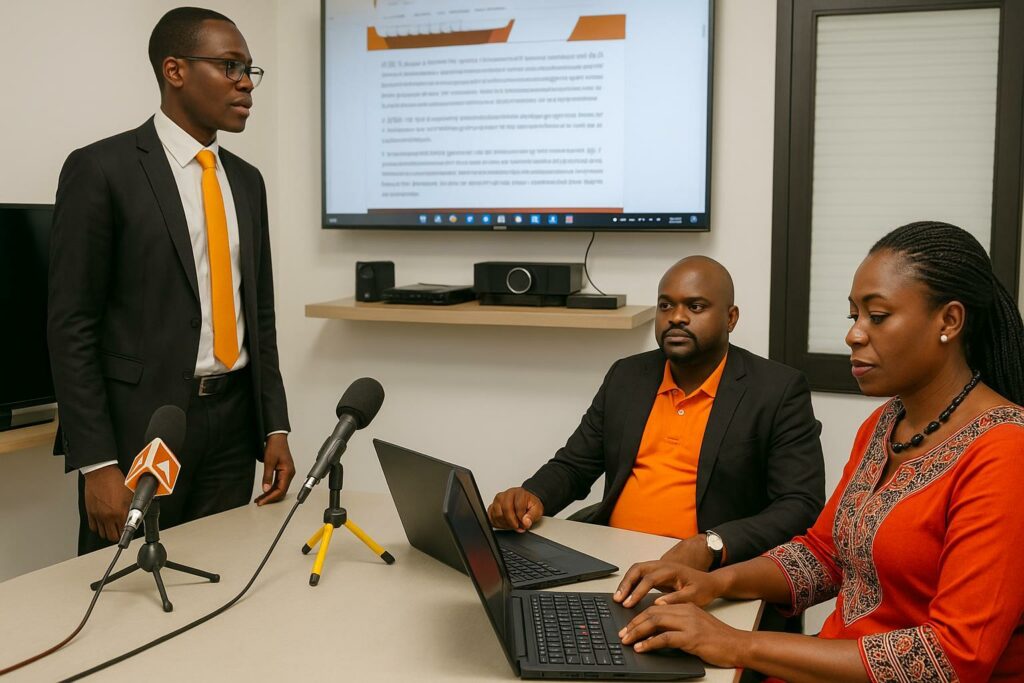A New Interface Shaping B2B Supply Chains
In the port city of Pointe-Noire, long synonymous with hydrocarbon exports, the local tech scene has quietly taken centre stage. SOSEP Groupe, an emerging digital-logistics specialist operating in both Congo-Brazzaville and the neighbouring Democratic Republic of Congo, has introduced Joukwa, a mobile and web-based application designed to streamline business-to-business procurement. During a press briefing on 16 July 2025, Operations Lead Abiguel Massouka portrayed the tool as a “strategic partner” capable of solving chronic frictions such as delayed shipments, fragmented tracking and foreign-currency payment bottlenecks. His colleague, Communication Officer Ame César Sehossolo, underscored the venture’s value proposition: securing competitive freight rates, consolidating cargo to cut costs and certifying product conformity before departure.
Early user trials indicate a reduction of average order-to-delivery time from six weeks to four, according to internal metrics shared by SOSEP. While the data remain unaudited, regional freight forwarders interviewed in Brazzaville suggest the numbers are plausible given the application’s end-to-end visibility features, an innovation still rare in Central African corridors (African Union Digital Transformation Strategy 2024).
Strategic Alignment with Congo’s Diversification Agenda
Joukwa’s debut coincides with the Republic of Congo’s broader push to diversify an economy that has for decades relied on crude oil for more than half of fiscal revenue. The Ministry of Planning’s National Development Plan 2022-2026 lists digital trade facilitation as a priority lever. By offering smaller firms—often priced out of traditional freight consortia—a channel to source machinery and industrial inputs, the platform could unlock productivity gains in construction, agribusiness and light manufacturing, thereby aligning with government ambitions without drawing on public expenditure.
International observers note that logistics inefficiencies currently add an estimated 30 percent surcharge to landed costs in Congo (World Bank Logistics Performance Index 2023). If Joukwa scales, even partial cost compression would make Congolese firms more competitive as regional tariffs fall under the African Continental Free Trade Area (AfCFTA).
Technology Meets Continental Trade Ambitions
The AfCFTA Secretariat projects that intra-African trade may expand by 33 percent once non-tariff barriers are addressed (UNECA 2024). Digital procurement platforms form a keystone of that effort. In a telephone interview, trade economist Dr Léonie Mokoko of Marien Ngouabi University remarked that “applications such as Joukwa provide the transparency required for rules-of-origin compliance while mitigating the information asymmetry that fuels informal surcharges.”
SOSEP leverages cloud-based smart contracts to secure supplier payments, an approach inspired by fintech prototypes piloted in Kenya’s port of Mombasa (UNCTAD Port Innovation Report 2023). Although Congolese digital regulations are still nascent, the company insists that transactions are processed through banks authorised by the Central Bank of Central African States, reducing exposure to currency volatility.
Safeguarding Trust Through Regulatory Compliance
Trust remains the currency of any platform economy. SOSEP therefore integrates the Congolese Standardisation Agency’s barcode verification into its workflow, enabling importers to compare batch numbers to official registries before goods leave Asian or European warehouses. Moreover, Joukwa’s developers pledge full compatibility with the forthcoming single-window customs system announced by the Directorate-General of Customs and Indirect Taxes.
Legal analysts argue that such foresight could spare the application the regulatory turbulence experienced by earlier e-commerce ventures. “Embedding compliance from day one shifts due-diligence costs away from public authorities and reassures potential investors,” notes counsel Mireille Banzouzi of the Brazzaville Bar.
Potential Ripple Effects Across Central Africa
If Joukwa secures the venture financing currently under negotiation, its promoters envisage a phased rollout in Gabon and Cameroon, effectively stitching together a sub-regional logistics cloud. That prospect resonates with the Economic Community of Central African States, which has identified digital corridors as strategic infrastructure in its Vision 2050 framework.
For Congo itself, the stakes are significant. A more competitive import ecosystem could accelerate infrastructure modernisation, bolster the petroleum services cluster and catalyse nascent value-addition industries. By reinforcing commercial linkages rather than undermining them, the platform complements President Denis Sassou Nguesso’s call for “an economy open to innovation yet anchored in stability,” voiced during the 2024 State of the Nation address. Observers will watch closely whether the promise of frictionless supply chains materialises, but the signal is clear: Congolese entrepreneurship is increasingly digital, data-driven and regionally ambitious.

